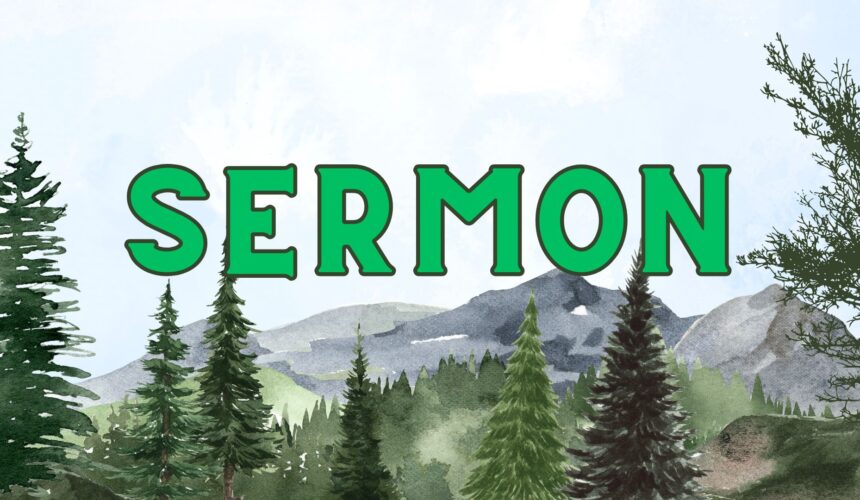A Christian Politics, Week 1
4th Sunday after Pentecost
July 6, 2025
1 Thessalonians 5:18 – 22
I’ve mentioned before that I’ve taken several prayer retreats to a Benedictine Monastery in New Mexico called “Christ in the Desert.” Christ in the Desert is not impossible to get to by any means, but it’s kind of isolated. It’s about a six hour drive from here. You have to get off the freeway, go through a few small towns and then turn off the two lane blacktop and drive about 10 miles up a Forest Service road. When you get to the end of the road, you’re there. The monastery only got electric power maybe 15 years ago, and the last time I was there, which has been a few years, they did ask us to conserve our use of electricity because they run the place on solar energy and didn’t want to deplete the batteries that stored power overnight. There’s one computer with a cable internet connection that’s available to guests, but there’s no wifi and no cell signal out there, so even though the place has all the basic comforts of room and community and good food and incredible natural beauty, it does feel kind of remote when you’re there.
Over the years, I’ve had a few conversations with monks who live in the monastery. It’s not like we’re tight buddies or anything, but I’ve gotten to know a little bit about them and I respect them enormously. If you’re staying there, you can volunteer to help the monks with any daily work they might have – whether it’s gardening or helping in their little bookstore they keep open for guests and visitors or whatever it is.
One day three or four of us who were on retreat there were doing just that: we were helping in the bookstore stocking shelves and straightening things up. And we got into a conversation with one of the monks who lives there. He must have been older than he looked. I would have guessed him at maybe a youthful 40 or 45, but he said he had taken his monastic vows in the 1970s. He had lived in several monasteries since then, which I guess is not that unusual. But for the past 20 years or so, he had been there at Christ in the Desert.
We got to talking about the monastic rhythm of life, about how since the 6th century when the Benedictine movement began, monks had built their lives around this classical rhythm of prayer and work to maintain the monastery. He told us how this daily pattern had become his life, to the degree that it felt strange to do anything else, even for a couple days. He had some medical appointments coming up – he had to go see a doctor, maybe even spend a few days in a hospital for a surgery – and he talked about how weird that was going to feel to him: not so much the surgery or the doctor, but being away from the monastery for a few days because he was so accustomed to being there and living in that rhythm.
At that point that one of the people in our group said, “I have kind of a weird question, but I’ve always wondered this. Do you vote? Like in national or local elections, do you go to a polling place or get mail in ballots and vote?”
The monk seemed to think that was funny. He kind of smiled and chuckled and said, “no, I haven’t voted in decades. And I really shouldn’t, because I don’t pay enough attention to current events to know about the candidates or understand the issues. So no, I don’t vote.”
When I heard that I started laughing. I was reminded of that line – I can’t remember who said this, but I love it – that line about how the United States is a country where we all feel qualified to hold an opinion whether we know anything about the subject or not. I started laughing because I found his attitude so refreshing. Instead of holding forth on his political views or the official positions of the Catholic Church, here was this kind, humble, personable monk, smiling at us and basically saying, “you don’t want me voting. I’d probably do more harm than good because I don’t know what’s going on in the world.”
Now, I don’t know what he thinks about this today. I haven’t seen him in several years. I’m going back for a few days this coming September, so maybe I’ll have the chance to ask him then.
But I’ve thought about that conversation over the years, and sometimes I find myself wondering: was he being responsible? I mean, I’m no monk, that’s for sure. We’re in very different situations. I like visiting the monastery for a week or so, but I don’t want to live there. I like being married, for one thing, and I like the life I have. But in some ways, he and I aren’t so different.
We’re both U.S. citizens, both born in this country. We’re both Christians, committed to our faith, albeit in somewhat different ways. But I was always taught and I’ve believed strongly since I was maybe in middle school that it is the duty, the obligation, of every American to exercise whatever power we have to perfect our union, to try and make this country, this ongoing experiment in self-governance, better. So as refreshing as I found his answer and his attitude, and as much respect as I have for him, I have to wonder: was he abandoning some part of his duty as a citizen because of his commitment to monastic life?
Now I don’t mean to blow this out of proportion. We’re talking about one guy here; one vote in a national election in which something like 154 million people voted. And we can argue about the electoral college and whether his one vote would have made any difference at all, and how that depends on how he voted and what state he voted in and all that. I get it. You are welcome to think whatever you want to think about the electoral college and anything else, for that matter. But there’s a bigger question at stake here than just whether that one monk had a responsibility to cast one vote in one national election.
If we wanted to ask the question more broadly, we might ask it this way: what is the relationship of our faith to our politics? How should Christians be involved in politics? How can we meaningfully live out our faith in the political arena?
Over the next few weeks, I want to approach that question, not be prescribing answers to it, but by looking at specific ways Christians have been involved in politics at different moments in Christian history.
I want to approach this series in that way because I believe very strongly in three ideas.
First, as you’ve maybe heard me say about Biblical interpretation, there is more than one right way to be a politically committed Christian. There’s more than one right way to practice faithful politics. And I think Christian history shows us that.
Now, there are definitely some wrong ways to do that, and in the next few weeks I’ll mention what I see as some of the wrong ways to let our faith guide our politics. But Christian faith is incredibly diverse, and there’s a broad spectrum of political positions and participation within it. One of my dreams for this church and for every church I serve is that we can be a community of people who hold diverse social and political positions based on our faith, and who can learn from each other because what holds us together in Christ is vastly more important than what divides us at the ballot box or anywhere else.
There’s a second reason I want to approach this series by looking at some ways that Christians historically have put faith into action. And I want to be really clear about this. Over the next few weeks as we look at this question of how Christians have been involved in politics, I will not be telling you that you all need to go join the Republican party, or all become Democrats or how you should back the Green Party or be a libertarian or a democratic socialist or whatever. The church is not my personal political platform. It’s not anybody’s personal political platform. Remember that old hymn? “The church’s one foundation is Jesus Christ, her Lord. She is his new creation through water and the word.” Ou responsibility as Christians is not to belong to a particular political party or faction, but rather to be the new creation of Jesus Christ. And in my experience, that tends to cut across the traditional political divisions of our country that have us so crossways and angry right now. I’ll say more about that in the next few weeks, but for right now I just want to be clear: This sermon series is NOT intended to tell you what your politics should be. The question is how to practice our political involvement faithfully.
At the same time, I do think that there are Christian ways, Christian attitudes and stances, from which to practice our politics, wherever on the political spectrum we may fall. And over the next few weeks I want to look at how some Christians have actually done that to give us some idea of how we might be faithfully engaged in the public life of our country. Because siblings in Christ, I know this sounds insane. But I believe that Christian faith communities have an enormous amount to contribute to our politics and our society right now. I believe we’re necessary, and I think that’s especially true of Methodism. I know that sounds crazy, but I think we’re needed.
Finally, the third reason I want to take this historical approach is that I think we’ll see, at least in the case of the people and movements I want to look at, I think we’ll see that nobody gets it 100% right. Every Christian movement that aims to influence society makes mistakes. But that is no reason not to try. I love this passage we heard this morning from 1 Thessalonians. This book is probably the earliest piece of writing in the New Testament. Decades before the Gospels were written, decades before the Book of Acts or Revelation, Paul wrote this letter to the church at Thessalonica and in it we see the kind of movement that Paul and other early Christian leaders are trying to build. He says, “See that none of you repays evil for evil, but always seek to do good to one another and to all. Rejoice always, pray without ceasing, give thanks in all circumstances; for this is the will of God in Christ Jesus for you. Do not quench the Spirit. Do not despise the words of prophets, but test everything; hold fast to what is good; abstain from every form of evil.”
Paul is writing to a small group of Christians less than 20 years after Jesus was crucified and resurrected. And even that early on in the movement, he’s telling them, “do good to all.” Not just to other Christians, but to all. This faith of ours was never meant to be a movement for select insiders. It was never meant to be a movement that retreated from the world, that disengaged and kept to itself. Christianity was always intended to change the world for the better.
But Paul is no fool. He knows the church will make mistakes; he knows there will be moments when Christian leaders get off the path, moved by greed and lust for power and all the things we see too often in the church even today. So Paul says, “Don’t despise the prophets, but test everything.” Test everything, against your experience, against your understanding of God, against what you are trying to accomplish. Because in the end, what we are trying to accomplish is nothing less than making room for God to work in the world. What we are trying to accomplish is nothing less than allowing God to bring the perfect peace and perfect justice that our tradition has thirsted after for centuries. We very probably won’t get there in our lifetime. But we come from a long line of people who have tried. Over the next few weeks, I want us to ask the question of how we might follow in the footsteps of that great cloud of witnesses.


